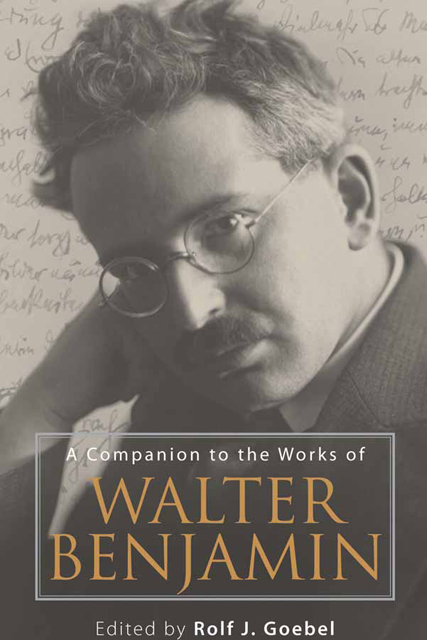Book contents
- Frontmatter
- Contents
- Preface
- Sources of Benjamin’s Works
- Chronology of Benjamin’s Major Works
- Introduction: Benjamin’s Actuality
- 1 Walter Benjamin's Criticism of Language and Literature
- 2 The Presence of the Baroque: Benjamin’s Ursprung des deutschen Trauerspiels in Contemporary Contexts
- 3 Lost Orders of the Day: Benjamin's Einbahnstraße
- 4 Literature as the Medium of Collective Memory: Reading Benjamin’s Einbahnstraße, “Der Erzähler,” and “Das Paris des Second Empire bei Baudelaire”
- 5 Benjamin in the Age of New Media
- 6 One Little Rule: On Benjamin, Autobiography, and Never Using the Word “I”
- 7 The Passagen-Werk Revisited: The Dialectics of Fragmentation and Reconfiguration in Urban Modernity
- 8 Benjamin’s Politics of Remembrance: A Reading of “Über den Begriff der Geschichte”
- 9 The Legacy of Benjamin’s Messianism: Giorgio Agamben and Other Contenders
- 10 Paris on the Amazon? Postcolonial Interrogations of Benjamin’s European Modernism
- 11 Benjamin’s Gender, Sex, and Eros
- 12 Sonic Dreamworlds: Benjamin, Adorno, and the Phantasmagoria of the Opera House
- Select Bibliography and List of Further Reading
- Notes on the Contributors
- Index
Introduction: Benjamin’s Actuality
Published online by Cambridge University Press: 28 February 2023
- Frontmatter
- Contents
- Preface
- Sources of Benjamin’s Works
- Chronology of Benjamin’s Major Works
- Introduction: Benjamin’s Actuality
- 1 Walter Benjamin's Criticism of Language and Literature
- 2 The Presence of the Baroque: Benjamin’s Ursprung des deutschen Trauerspiels in Contemporary Contexts
- 3 Lost Orders of the Day: Benjamin's Einbahnstraße
- 4 Literature as the Medium of Collective Memory: Reading Benjamin’s Einbahnstraße, “Der Erzähler,” and “Das Paris des Second Empire bei Baudelaire”
- 5 Benjamin in the Age of New Media
- 6 One Little Rule: On Benjamin, Autobiography, and Never Using the Word “I”
- 7 The Passagen-Werk Revisited: The Dialectics of Fragmentation and Reconfiguration in Urban Modernity
- 8 Benjamin’s Politics of Remembrance: A Reading of “Über den Begriff der Geschichte”
- 9 The Legacy of Benjamin’s Messianism: Giorgio Agamben and Other Contenders
- 10 Paris on the Amazon? Postcolonial Interrogations of Benjamin’s European Modernism
- 11 Benjamin’s Gender, Sex, and Eros
- 12 Sonic Dreamworlds: Benjamin, Adorno, and the Phantasmagoria of the Opera House
- Select Bibliography and List of Further Reading
- Notes on the Contributors
- Index
Summary
IS OUR TIME — LATE CAPITALIST POSTMODERNITY in the age of globalizing politics and digital media — particularly destined to actualize Walter Benjamin? If one understands actuality (Aktualität) to be a critical moment in which something or somebody in the past becomes simultaneously real and current for the present, and by actualization (Aktualisierung) the historically contingent process of bringing about this actuality, then the answer seems to be a resounding “yes.” As even the most casual Internet surfing will show immediately, Benjamin's texts and images are everywhere, at least in cyberspace. But as with any apparently obvious answer, the very terms of this one need to be continually reexamined and reconfirmed in order to retain their legitimacy. Indeed, the question and its answer require the posing of other questions: How do we make Benjamin our intellectual contemporary without resorting to the clichés of the timelessness and universality of great thinkers or ideas? On the other hand, how do we historicize him — read him in the context of his own cultural time and space — without reducing him to a passive object of seemingly dispassionate research agendas? Which of Benjamin's own theories and critical concepts can we employ for an innovative understanding of his thinking in his original context and in our own? And, finally: are the notions of actuality/actualization as employed here akin to the ideal of self-actualization, commonly known as the realization of one's innate potential? In other words, how do we actualize Benjamin?
It may be wise to begin tackling such questions by reviewing some rather obvious reasons why Benjamin ought to resonate particularly well with our times. First of all, there is the immense spectrum of his writings, which encompass literary criticism and metaphysical speculations on language; political theory, and the philosophy of history; analyses of photography, film, and other media; autobiographical writings and travel essays; radio talks for young people; and translations. Equally diverse are the traditions from which he borrowed eclectically for his own syncretistic thought: classical philosophy and idealist aesthetics, Jewish mysticism and Marxist materialism, surrealism and the avant-garde. The historical context of these intellectual explorations — the modern European metropolis between the end of the bourgeois materialism of the Wilhelminian Empire and the demise of the Weimar Republic's liberal democracy in the cataclysms of the Third Reich and the Second World War — continues to fascinate and terrify us, even though it is always threatened by collective repression and oblivion. Paradoxically, however, the very terms in which Benjamin focused on this particular cultural territory contain anticipatory moments and even dialectical reversals that transcend the particular space and time of their origins and allow for a conceptual re-translation into other times, other cultures, other histories.
- Type
- Chapter
- Information
- A Companion to the Works of Walter Benjamin , pp. 1 - 22Publisher: Boydell & BrewerPrint publication year: 2009



